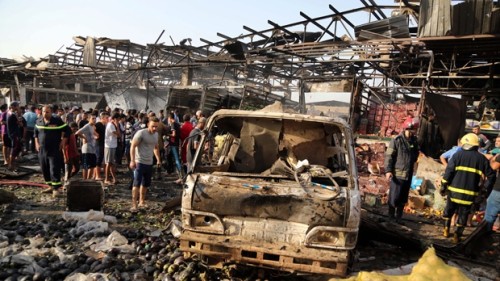PHOTO: Scene of Thursday’s Islamic State bombing of Sadr City in eastern Baghdad (Karim Kadim/AP)
Balsam Mustafa writes:
Residents of Iraq’s capital Baghdad woke on Friday to news of a huge blast in the Jamila wholesale food market in the al-Sadr City area, killing at least 67 people and injuring more than 200.
The Islamic State claimed responsibility for the truck bomb that tore through buildings, killed horses used to transport vegetables, and burned vehicles. Many of the victims in the mainly-Shia district are poor food vendors. who are mostly Shias.
Eyewitnesses said the blast was so large that it was beyond comparison with other bombings, with some claiming that more than 150 people were killed.
The bombing followed another large explosion in Howeider, near Diyala Province’s capital Baquba in eastern Iraq on Monday, which kllled 33 people. News has also circulated that more than 1,000 Iraqis in Mosul, Iraq’s second city, were executed by the Islamic State in the last two weeks on accusations of cooperating with Iraqi forces and police.
The political significance of their attacks is their proximity to the reform package announced by Prime Minister Haidar al-Abadi and approved by the Iraqi Parliament this week. Those reforms were partly in response to protests by thousands of Iraqis in Baghdad, Basra in the south, and other cities in the past month.
See Iraq Analysis: These Protests Are A Turning Point in My Country’s History
On Thursday, al-Abadi used a speech to support the protests, expressing pride in coexistence between Iraqis and security forces but warning against sabotage of the demonstrations to spur political conflict. He said he will continue with reforms and fight corruption, while asking Iraqis not to demand “impossible measures” that contradict the Constitution. Telling Parliament that he is not satisfied with its performance, he asked for authority to make necessary changes.
The Islamic State’s attacks are likely to pose a challenge to the Prime Minister through further demonstrations, as Iraqis ask about the failure of the Government and politicians to stop the militants and protect civilians. A large turnout is expected today after Friday Prayers.
Activists and journalists are asking protesters to maintain a challenge which is beyond any sectarian conflict between Sunni and Shia Muslims and any rivalry between political factions. They are asking marchers to hold only the Iraqi flag and to chant for the Iraqi nation.
In his speech on Thursday, al-Abadi said that the Islamic State’s executions in Mosul and bombing in Diyala Province would trying to break Iraqi “unity”.
But, as Iraqis return to the streets today, can the Prime Minister give them a reason to stand together behind his Government?

